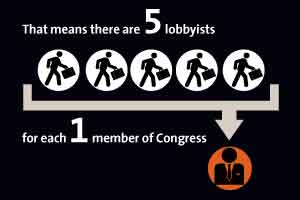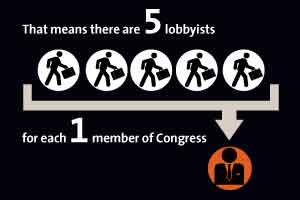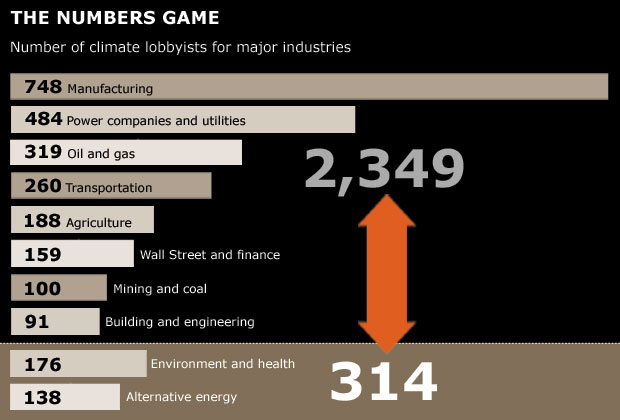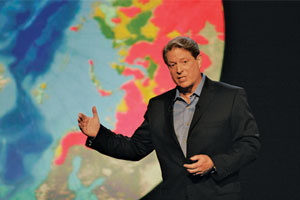
Compiled by Rachel Morris from data from the Center for Public Integrity.
For a long time, the climate change debate in Washington took place along predictable lines: industry on one side, environmentalists on the other. But now, with the prospect of actual legislation passing Congress, and the attendant opportunities for political and financial gain, the competition has erupted into a giant free-for-all. Since 2003, the climate lobby has grown by more than 400 percent, to a total of 2,810 lobbyists—5 to every lawmaker.
The largest players are still formidable: The American Coalition for Clean Coal Electricity, a collection of power companies and mining, rail, and manufacturing interests, spent $9.95 million lobbying Congress and the White House last year, more than any other group devoted solely to climate change. But there are now also 138 lobbyists representing alternative energy technologies. Environmental and health lobbyists numbered fewer than 50 six years ago; there are now 176. (Still, the alternative energy and environmental lobbyists put together are outnumbered more than 7-to-1 by those for major industries.)
Perhaps the most telling shift in the debate is the complex position of big business, once a reliable foe of carbon restrictions. This year, the US Chamber of Commerce and the National Association of Manufacturers opposed the Waxman-Markey cap-and-trade bill, but tech companies like Google (which is interested in smart-grid technology) and Sun Microsystems (which is developing more energy-efficient servers) support it. Business for Innovative Climate and Energy Policy, a coalition that includes eBay, Symantec, Nike, and Starbucks, is actually lobbying for greater emissions cuts. By contrast, the US Climate Action Partnership, a coalition of corporations such as General Motors, Duke Energy, ConocoPhillips, and Dow Chemical as well as environmental groups such as the Natural Resources Defense Council, lobbied for and won a massive giveaway of emissions credits that President Obama had wanted polluters to pay for. Another new player is the finance industry, which had virtually no lobbyists on global warming in 2003. This year, banks like Goldman Sachs and JPMorgan Chase, as well as insurance companies and private equity firms, have 159 representatives working on the issue. The companies are eager to jump into the carbon market that a cap-and-trade system would create, which by one regulator’s estimate could be worth $2 trillion. Wall Street wants this market to be loosely regulated and open to speculators, and it wants it to include over-the-counter derivatives—the unregulated instruments that caused insurance giant AIG to implode.
And the list goes on. Because energy is so central to the economy, everyone has a stake in the climate fight—from the massive transportation and agriculture (see “Betting the Farm“) lobbies down to churches and local governments. No wonder the bill ballooned from 648 pages to more than 1,400 by the time it completed its journey through the House.

The number of lobbyists working the Hill on climate change has increased more than
400%
2003: 525 | 2009: 2,810


Source: Center for Public Integrity

















